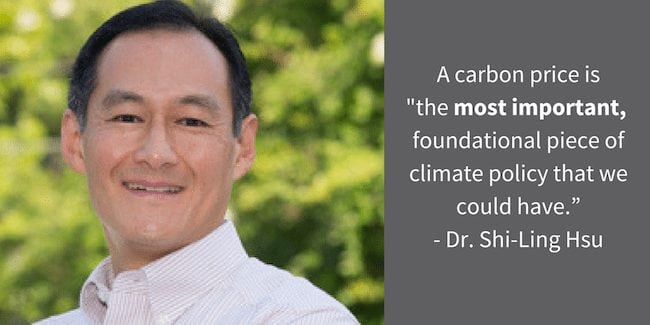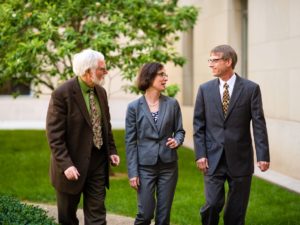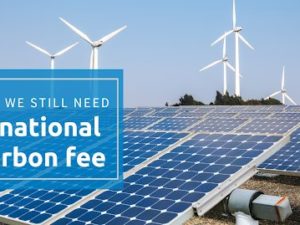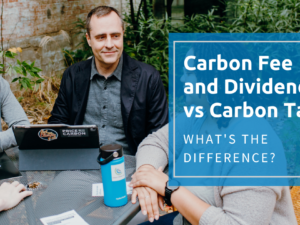Carbon pricing: An incentive to innovate
By Flannery Winchester
Each month, Citizens’ Climate Lobby hosts an online meeting featuring a guest speaker to educate listeners on topics related to climate change and our Carbon Fee and Dividend proposal. Check out recaps of past speakers here.
Our guest speaker for September 2017 was Dr. Shi-Ling Hsu, who has been one of CCL’s most important advisers for years. Dr. Hsu is the D’Alemberte Professor of Law and Associate Dean for Environmental Programs at the Florida State University College of Law. Before entering academia, Dr. Hsu was a senior attorney and economist for the Environmental Law Institute in Washington, D.C.
Executive Director Mark Reynolds welcomed Dr. Hsu to the call with a glowing recommendation of his book, “The Case for a Carbon Tax.” Mark said, “I believe it is by far the best book on carbon pricing, and every chapter should have one.” Why? “There’s a lot of academics who have written similar books, but they write them for academics. For someone like me who had no background in carbon pricing, no background in economics, I was able to learn so much important information.”
An efficient, effective climate solution
In his book, Dr. Hsu laid out the three essential ways to approach dealing with the emissions that cause climate change. There’s the regulatory approach and two market-based approaches: cap and trade, or a fee. “The book makes a very strong assertion that a market-based solution is always more efficient, and that a fee is actually more efficient than a cap,” Mark explained in his introduction, and that’s where Dr. Hsu picked up his comments on September’s call.
“Economists believe that carbon pricing is better than most traditional regulatory approaches in most cases. That’s not to say that a carbon tax will do everything that we want it to do,” Dr. Hsu said. But, he continued, “It is widely agreed upon that it’s the most important first step and foundational piece of climate policy that we could have.”
From an economist’s perspective, Dr. Hsu said, agencies tend to do an “okay” job of regulating emissions, but they don’t usually find the most efficient way to do things. “The reason that economists tend to favor carbon prices—and more so a carbon tax than a cap and trade—is that economists believe in markets. Economists believe that markets find efficient ways to do things, that markets provide the incentives for people to find efficient ways to do things,” Dr. Hsu explained.
Incentives to innovate and save
“One of the things that a carbon price can do, that a fee or a tax does very well, is to provide incentives for people to innovate, to find ways to do things more cheaply,” Dr. Hsu said. We see that all the time in other parts of the economy—when people are presented with options, they will usually find cheap, smart ways to achieve their goals. It’s not usually about the environment; it’s about their bottom line.
Dr. Hsu told a personal story to illustrate this. In 2008, he and his growing family were renovating their home in Vancouver, British Columbia. It was right about the time British Columbia’s carbon tax was being implemented. The contractor handling the renovation sat Dr. Hsu down and said, “These are the things I want you to think about.” He gave him a list of sophisticated options like high efficiency water heaters, high efficiency windows, and other solutions to save on energy costs. He said, “You know, Professor, there’s a carbon tax coming online in British Columbia, and you’d better be aware of what that’s going to cost you.” Dr. Hsu resisted the urge to tell the contractor that he knew all about the carbon tax—instead, he listened to the contractor’s suggestions.
“It became clear that he knew a lot more about how to reduce emissions than a lot of the so-called experts I had been palling around with,” Dr. Hsu said. “It’s because he had a lot of clients who were asking about the carbon tax and asking him, ‘How do we save money?’” In response, that contractor had to go figure out more energy-efficient, and now cheaper, solutions.
“If you think about who has control over emissions, it’s all of us,” Dr. Hsu pointed out. “It’s not just a few polluters. It’s all of us. We can make choices about what we buy, how much electricity we use, how much we drive. The best way to incentivize behavior on the part of all those millions and millions of actors is to have a carbon price that can ripple across the whole economy.” Dr. Hsu’s contractor is just a single example of how people could creatively reduce emissions in response to a carbon price.
And of course, big emitters will enjoy those same incentives to reduce their emissions, because they will also stand to save money. “The way to win this is not to think of this as a zero-sum game, but to think of it as a climate policy in which everyone gets something out of it. Everybody gets to be a good guy in their own story,” Dr. Hsu said. “To the extent that you can find a policy where emitters and polluters get to be heroes by saving themselves a little bit of money and getting more emissions down, that’s a win-win situation.”
Hear Dr. Hsu’s full remarks, including his perspective on using carbon pricing revenue for a dividend compared to a tax swap, on our September 2017 podcast or on Youtube. You can also follow him on Twitter at @shilinghsu.






